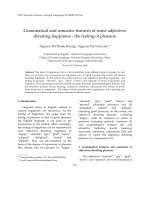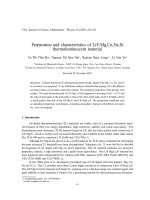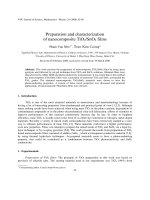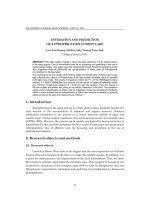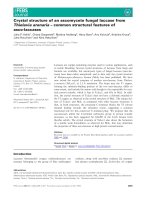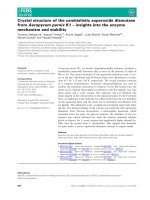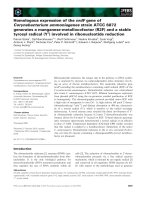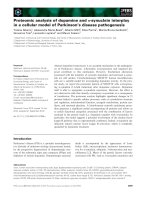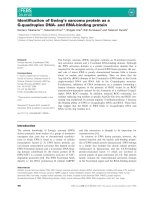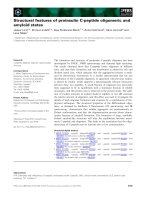Tài liệu Báo cáo " Grammatical and semantic features of some adjectives denoting happiness - the feeling of pleasure " pdf
Bạn đang xem bản rút gọn của tài liệu. Xem và tải ngay bản đầy đủ của tài liệu tại đây (179.68 KB, 10 trang )
VNU Journal of Science, Foreign Languages 24 (2008) 157-166
157
Grammatical and semantic features of some adjectives
denoting happiness - the feeling of pleasure
Nguyen Thi Thanh Huong
1
, Nguyen Thi Van Lam
2,
*
1
Department of English - American Language and Culture,
College of Foreign Language, Vietnam National University, Hanoi,
2
Department of Foreign Language, Vinh University
Received 29 February 2008
Abstract. The topic of happiness draws a lot of attention from different types of people. In fact,
there are so many ways to express our happiness, one of which is employing words and idioms
denoting happiness. In this article, the authors discuss five adjectives denoting happiness - the
feeling of pleasure: “cheerful”, “gay”, “glad”, “merry” and “pleased” in terms of grammar and
semantics. Their grammatical features include syntactic functions and morphological features, and
the semantics includes lexical meaning, synonyms, antonyms, collocations and idioms of which
these words are a component. The authors finally provide some suggestions in the teaching and
learning of as well as in the translation concerned with the words.
1. Introduction
*
Linguistic items in English utilized to
express happiness are numerous. As the
feeling of happiness can range from the
feeling of pleasure to that of great pleasure,
the English language is not poor in the
expressions of the feeling. More concretely,
the feeling of happiness can be expressed by
such adjectives denoting happiness as
“happy”, “cheerful”, “gay”, “glad”, “merry”,
“pleased”, “delighted”, “elated” and
“jubilant”. They are sub-classified, on the
basis of the degree of expression of pleasure
they denote, into two groups: (1) “happy”,
______
* Corresponding author. Tel.: 84-4-(038)3555656
E-mail:
“cheerful”, “gay”, “glad”, “merry” and
“pleased” (denoting pleasure) and (2)
“delighted”, “elated” and “jubilant”
(denoting great pleasure). In this article, the
adjectives denoting pleasure, excluding
“happy”, shall be explored in terms of
grammar including syntactic functions [1]
and morphological features [2], and
semantics including lexical meaning,
synonyms, antonyms, collocations [3,4] and
idioms of which the adjectives denoting
pleasure is a component [3-5].
2. Grammatical features and semantics of
adjectives denoting pleasure
The adjectives “cheerful”, “gay”, “glad”,
“merry” and “pleased” are to be discussed in
N.T.T. Huong, N.T.V. Lam / VNU Journal of Science, Foreign Languages 24 (2008) 157-166
158
this section in term of grammar and
semantics based on the information collected
from the English native speakers and such
dictionaries as Oxford Advanced Learner’s
Dictionary of Current English [6], The American
Heritage Dictionary of The English Language [7]
and Oxford Dictionary of English Idioms [8].
These adjectives denote an emotion of
pleasure people have, but in not the same
ways. According to Quirk et. al. (1972), they
can function as head of adjectival phrases,
pre-modifier of noun phrases, and
complement of such verbs as “appear”, “be”,
“become”, “feel”, “look”, “seem” and
“make”, with or without taking
complementation. They all denote the
property of feeling pleasure but not the one
at a great degree; thus, they can be modified
by such intensifiers of degree as “very”, “so”,
“extremely”, etc To some extent they are
synonymous with “happy”, but to some
other extent they are not. We shall analyze
these words in turn:
2.1. “Cheerful”
2.1.1. Grammatical features and semantics of
“Cheerful”
“Cheerful” shares the syntactic functions
of adjectives denoting the property of feeling
pleasure except for the fact that it cannot take
complementation. Morphologically, it
consists of two morphemes, the root cheer
and suffix - ful. It does not allow inflection for
comparative and superlative forms.
However, it has a very productive root cheer,
and has two derivatives: “cheerfulness” (n)
and “cheerfully” (adv).
Semantically, “cheerful” is polysemous,
used formally, informally, and in literature
with its three senses: (a) “in good spirits,
feeling pleasure all the time”, (b) “pleasantly
bright, likely to cause happy feelings”, and
(c) “helpful and enthusiastic, reflecting
willingness”. “Cheerful” in the first sense is a
near-synonym of “happy”, for part of the
meaning of “cheerful” suggests a good
characteristic of somebody, not just a happy
feeling when something good happens.
“Cheerful” is a synonym of the old-fashioned
word “cheery”, collocating with nouns
denoting people to describe one of their
characteristics as in “a cheerful child”, and
with “disposition”, “smile”, “grin”, “tone”,
etc., as in “a cheerful disposition/smile/grin” and
“in a more cheerful tone”. In the second
sense, it is an antonym of “cheerless”, which
means “dull and depressing”, collocating
with such typical nouns as “music”, “news”,
“room”, “conversation”. “Cheerful” in the
third sense collocates with nouns denoting
people, e.g. “cheerful worker”’.
2.1.2 Words formed from “Cheerful”
“Cheerfulness” as a non-count noun can
function as head of noun phrases and clause
constituents: subject, object and complement,
and occur with the preposition “with” as in
“work with cheerfulness”.
“Cheerfully” (adv) can collocate with such
typical verbs as “live”, “accept”, “grin”, “say”,
“sing”, “smile”, “whistle”, “work”, and others.
The root “cheer” (n) is also a polysemous
word with two senses. “Cheer” with the first
sense “good spirits, a feeling of happiness
and confidence” is a non-count noun. This
sense is dated, literary or formal. “Cheer” in
the second sense “a shout of joy, praise and
encouragement” is a count noun widely used
at present. “Cheer” in the first sense can form
the derivative “cheerless” (adj), apart from
“cheerful” by means of derivation.
“Cheerless” meaning “lacking cheer;
depressing” also has two derivatives
“cheerlessness” (n) and “cheerlessly” (adv)
by means of derivation. ‘Cheery’ (adj) is also
N.T.T. Huong, N.T.V. Lam / VNU Journal of Science, Foreign Languages 24 (2008) 157-166
159
a derivative of “cheer” (n) with two
derivatives: “cheeriness” (n) and “cheerily”
(adv). “Cheery” means “showing or
suggesting good spirits” and synonymous
with “cheerful”, but is out-dated.
The root “cheer”, by means of zero
derivation, can change into “cheer” (v). “Cheer”
(v) has two senses. It is both an intransitive and
mono-transitive verb in the first sense of “give
shouts of joy, praise, support and
encouragement (to somebody or a team or a cast
of performers)”. In the second sense of “make
happier or more cheerful, less worried”, “cheer”
is a mono-transitive verb. It can form an
adjective “cheering” meaning “making cheerful,
encouraging” as in “cheering news”; and such
phrasal verbs as “cheer somebody on” meaning
“encourage somebody by cheering”, and “cheer
(somebody) up” meaning “(cause somebody to)
become cheerful”.
“Cheers” formed from “cheer” as a noun is
an interjection used for expressing good wishes
when drinking with someone, especially when
taking the first mouthful of a new drink. In
British English, it also means “goodbye” or
“thank you” in an informal way.
By means of compounding, “cheer” (n)
can form the compound “cheer-leader” (n)
which denotes either a person who leads the
cheering of spectators, as at a sports event or
the one who expresses or promotes
thoughtless praise as an adulator. It is used
especially in the United States. By means of
back-formation, the verb “cheer-lead” is
formed, meaning “lead organized cheering,
as at sports events” or “express or promote
automatic or servile praise”.
2.2. “Gay”
2.2.1. Grammatical features and semantics of “Gay”
“Gay” shares the syntactic functions of
“cheerful”. Morphologically, as a one -
morpheme word, it has two inflected forms
gayer (comparative) and gayest (superlative)
by virtue of inflection, and some derivatives
by means of derivation. Semantically, “gay”
has three senses: (a) “showing or
characterized by cheerfulness and
lighthearted excitement”, (b) “bright or
attractive so that one feels happy to see or
hear it”, (c) “homosexual; of, relating to, or
sharing the lifestyle and concerns of the
homosexual community”.
The first two meanings of “gay” have
become dated due to the presence of the third
meaning. “Gay” in the first sense is near-
synonymous with “cheerful” in the first sense,
for it describes the light-hearted spontaneity
rather than the characteristic. It is generally
used to qualify a gesture or a statement rather
than the person, thus collocating with such
words as “wave (of the hand)”, “smile”,
“laughter”, etc “Gay” in the second sense can
occur with “colours”, “streets”, “room” etc It
is rarely used in regular conversation, but
mostly used in dated literary works. However,
“gay” is pre-empted with its contemporary use
to denote male homosexuals. Examples of the
current use of “gay” include “Gay Liberation
Front”, “gay bars”.
2.2.2. Words formed from “Gay”
“Gay” (adj) in the first two senses has
“gaiety” as non-count noun or count noun,
“gaieties” as plural noun and “gaily” (adv).
“Gaieties” denotes happy events and activities,
especially at a time of public holiday. “Gay”
(adj) in the third sense has two noun derivatives
“gay” (n) (denoting gay people) and “gayness”
(n) (denoting the state of being gay).
2.3. “Glad”
2.3.1. Grammatical features and semantics of “Glad”
“Glad” has a number of the syntactic
functions as head of an adjectival phrase,
N.T.T. Huong, N.T.V. Lam / VNU Journal of Science, Foreign Languages 24 (2008) 157-166
160
attributive, predicative as subject complement
or object complement, taking complementation
types of prepositional phrases, that-clauses, and
to-infinitive post-modification and allowing
comparison structures of equality, inequality,
comparative and superlative. These syntactic
functions are not the same for all senses. In
other words, its syntactic functions may
depend on each of its senses. Morphologically,
as a one-morpheme adjective, “glad” has two
inflected forms: gladder (comparative) and
gladdest (superlative). It can form other related
words by means of derivation and
compounding.
Semantically, “glad” is a polysemous
word having five senses. “Glad” in the first
sense is synonymous with “happy” (in the
first sense), denoting the feeling of pleasure
about something good that has happened
(especially because a situation has improved).
It is frequently used informally and in
literature. It can be the head of adjectival
phrases, and function as complement; but in
this sense, it cannot be a pre-modifier of noun
phrases. As a complement “glad” can take
complementation types of prepositional
phrases with “about”; that - clauses and to -
infinitive post-modification, e.g.:
I was glad to learn/hear/see they’d reached
home safely.
She was very glad about her exam results.
“Glad” can be an object complement as in:
Her exam results could make them glad
The second sense of “glad” is “causing or
bringing happiness”. In this sense, “glad” can
only be a pre-modifier of noun phrases as in
“glad news”, “glad days”, and “a glad
occasion”. The third sense of “glad”, though
archaic, is “showing happiness”. “Glad” can
also only be used attributively in this sense,
e.g. “a glad cry”, “a glad expression”.
Another sense of “glad” - “very willing”
makes it synonymous with “happy” again.
Like “happy” in the same meaning, it is a
formal word functioning as subject
complement taking the complementation
type of to-infinitive post-modification; but
cannot take comparison structures, and
cannot be a pre-modifier of noun phrases:
I shall be only too glad to help you study history.
The last sense “grateful, appreciative”
makes the word distinct from “happy”. In
this sense, it can play the function of subject
complement only taking prepositional
phrases with “of”, as in:
I’d be glad of some help with these boxes.
2.3.2 Words formed from “Glad”
It can form such derivatives as “glad” (v),
“gladden” (v), “gladness” (n) and “gladly”
(adv) by means of derivation. “Glad” (v) as
an archaic verb is a descriptive synonym of
“gladden” (v). Both of them mean “make
glad or happy”. “Gladden” (v) is a mono-
transitive verb, often collocating with “one’s
heart” as in:
The news gladdened his heart.
“Gladness” (n) means “happiness”.
“Gladly” (adv) means “happily, with
gratitude” and “willingly”. “Gladly” can also
be a constituent of a semi-idiom “not/never
suffer fools gladly”, meaning “not to be patient
with people whom one considers to be foolish”.
By means of compounding, “glad” can be
a constituent of such compounds as “glad
eye” (n), “glad hand” (n), “glad rags” (n) and
“gladsome” (adj). “Glad eye” is a British
English old-fashioned slang word meaning
“a look of sexual invitation”. “Glad hand”, an
old-fashioned informal word, means “a
warm welcome or greeting, especially one
made in order to gain personal advantage”.
The collocations “give somebody/get the glad
hand” are informally used with the meaning
of “treat somebody/be treated warmly and
N.T.T. Huong, N.T.V. Lam / VNU Journal of Science, Foreign Languages 24 (2008) 157-166
161
enthusiastically, but often insincerely”. By
means of zero derivation, “glad hand” can be
a mono-transitive verb, meaning “greet
somebody warmly and enthusiastically, but
often insincerely”. “Glad rags” is an informal
word in British English denoting clothes for a
special occasion or celebration. It is usually
used in its plural form. Finally, “gladsome”,
an archaic literary word, means “cheerful”.
To sum up, “glad” is a polysemous word
with five senses and it has different functions
in each sense. It is also a constituent of five
compounds, in which “glad” cannot be
literally interpreted and whose meanings
cannot be deduced from their constituents.
‘Glad’ can only be literally interpreted in the
archaic literary compound ‘gladsome’.
2.4. ”Merry”
2.4.1 Grammatical features and semantics of “Merr”
“Merry” also has the same syntactic
functions as “cheerful”. It is a one-morpheme
adjective, which has two inflected word-
forms: merrier (comparative) and merriest
(superlative) and can form other words by
means of derivation and compounding.
Semantically, it is also a polysemous word
with three senses. In the first sense “full of
lively happiness, fun”, used in literature,
“merry” is near-synonymous with “cheerful”
and “happy”, for it describes the outward
manifestations of enjoyment, especially in
entertainment. It can be a pre-modifier of
noun phrases, collocating with nouns
denoting people and other nouns, e.g. “life”
in “merry lives”; or associating with the
communication of enjoyment - through the
eyes, smile, speech, etc., e.g. “a merry smile”,
“merry eyes” or “a merry heart”. It can also be a
subject complement as in:
We were very tired, we were very merry.
“Merry” has another sense of “marked by
or offering fun and enjoyment at parties or
special occasions”. Though “merry” in
“Merry Christmas” conveys the idea of
festivities, it is near-synonymous with
“happy” since we can replace “happy” it for
it, making a wish with similar meaning.
“Merry” in this sense collocates with ‘day’,
“time”, “feast”, etc.
However, “merry” is informally used to
mean “rather drunk” as in:
We got a bit merry at the party.
2.4.2 Words and idioms formed with “Merry”
By means of derivation, “merry” has
three derivatives: “merriness” (n), “merrily”
(adv) and “merriment” (n). “Merriment” is a
non-count noun, formally used to denote
happy talk and laughter. By means of
compounding, “merry” is a constituent of the
compound noun “merry-go-around”. It is
also a polysemous word denoting either a
revolving circular platform fitted with seats,
often in the form of animals, ridden for
amusement, or a piece of playground
equipment consisting of a small circular
platform that revolves when pushed or
pedaled, or a busy social round, a whirl as in
“a merry-go-round of parties”.
“Merry” is also a constituent of the
compound noun “merry-making”, a literary
uncountable noun meaning “fun and
enjoyment, especially eating, drinking,
dancing and games”. This noun is formed
from the semi-idiom “make merry”, which
means “to have fun, especially eating,
drinking for enjoyment”. “Merry-maker” is
another noun formed from this idiom to
denote people who make merry. Another
idiom, of which “merry” is a component, is
“the more the merrier”. It is a literal idiom
meaning “the more people joined in an
activity, the more enjoyable it will be”.
N.T.T. Huong, N.T.V. Lam / VNU Journal of Science, Foreign Languages 24 (2008) 157-166
162
We have discussed the grammatical
features and semantics of “merry” as well as
words and idioms formed with “merry”.
“Merry” is a polysemous word with its
derivatives, compounds and idioms of which it
is a constituent. The important point to note is
that it may have similar or different syntactic
functions in its different senses. When denoting
one of happy states, it can function as pre-
modifier of noun phrases and complement
without taking complementation.
2.5. “Pleased”
2.5.1. Grammatical features and semantics of
“Pleased”
“Pleased”, as an adjective having an
identical form with, but different features
from, the past participle of the verb “please”,
has the syntactic functions as head of an
adjectival phrase and complement.
Morphologically, it has two morphemes: the
root please (v) and suffix - ed. It has no
inflected forms for comparative and
superlative. The noun derived from
“pleased” is also the noun derived from
“please” (v) - “pleasure” (n).
In terms of semantics, “pleased” is a very
standard term, having two senses. In the first
sense, it is descriptively synonymous with
“happy” and “glad” in their first senses,
denoting the feeling of pleasure or
satisfaction about something good that has
happened, but it is not as all-inclusive as
“happy”. “Pleased” is frequently used
informally with this sense. It is similar to
“glad”, but different from “happy” in that it
can be the head of adjectival phrases,
functioning as subject complement taking
complementation, and object complement
without taking complementation, but it cannot
be a pre-modifier of noun phrases in this sense.
The complementation types of “pleased” as
a subject complement are prepositional phrases
with “about” and “with”; that - clauses and to-
infinitive post-modification as in:
I am very pleased that you have decided to come.
The second sense of “pleased” is “willing”.
“Pleased” in this sense is also a synonym of
“happy” and “glad” with the same descriptive
meaning and connotation. Like “happy” and
“glad”, “pleased” in this sense is formally used,
playing the function of subject complement
taking complementation of the type of to-
infinitive post-modification only, as in:
We will be pleased to offer any assistance you
need.
2.5.2. Idioms with “Pleased”
“Pleased” is a constituent of two idioms.
“Pleased as Punch” is a culturally related
idiom, meaning “very pleased”. “Punch” is
Judy’s hook-nosed husband in the comic
puppet show “Punch and Judy”. He always
seems to be pleased and excited, especially
when doing something cruel to other
characters. The other idiom “pleased with
oneself”, a literal idiom, means “(too)
satisfied with what one has done”. These two
idioms can function as complement, but not
as pre-modifier of a noun phrase.
2.5.3. Words formed from “Pleased”
We are to deal with such words related to
“pleased” as “please” (v), “pleasing” (adj),
“pleasant” (adj), and “pleasure” (n). As the root
of “pleased”, “please” (v), a one-morpheme
word, has two senses. In the first sense of
“make (somebody) happy, give pleasure or
satisfaction (to)”, it is both an intransitive verb
and a mono-transitive one as in:
The girl in the shop is always eager to please
(everyone).
“Please” (v) in the first sense, as a mono-
transitive verb, has “gladden” and “delight”
N.T.T. Huong, N.T.V. Lam / VNU Journal of Science, Foreign Languages 24 (2008) 157-166
163
as near-synonyms. To please someone
supposes a definite effort being made to give
pleasure. The second sense of “please” (v) is
“want, like or choose” in which “please” as a
mono-transitive verb is formally used in
subordinate clauses, e.g. “whatever you
please”, etc “Please” in these two senses
cannot be used in progressive forms.
“Please” (v) is a lexical constituent of
three idioms. The idiom “If you please” is
formally used to give force after requests,
similar to the interjection “please”. It also has
an old-fashioned sense of “Can you believe
this?” in which, the idiom is a pure one, as in:
He’s broken my bicycle, and now, if you
please, he wants me to
Get it mended so that he can use it again.
“Please oneself” is a literal idiom,
meaning either “do whatever one likes
without having to obey others” or as an
informal imperative: “Do whatever you like,
it doesn’t matter to me”. “Please God” is a
pure idiom used formally in its sense of “I
hope; may God let it happen; may God grant
something”.
Apart from “pleased” (adj), the root
“please” has another derivative as adjective:
“pleasing” with the identical form of present
participle. Unlike “pleased” (adj), “pleasing”
(adj) has a derived adverb “pleasingly”.
“Pleasing” (adj) is formally used in the sense
of “likable, giving pleasure or enjoyment”, in
which “pleasing” is a pre-modifier of a noun
phrase as in “a pleasing young man”,
“pleasing dreams” and “pleasing eye or
face”; or a complement taking the
complementation type of prepositional
phrases with “to” as in:
The results were pleasing to both of us.
The adjective “pleasant” is also related to
“please” (v) in terms of form. It, however, has
such derivatives by means of derivation as:
“pleasantness” (n) “pleasantly” (adv),
“unpleasant” (adj), “unpleasantness” (n) and
“unpleasantly” (adv). “Pleasant” is a
polysemous word with three senses. The first
sense is “giving one a feeling of enjoyment or
happiness, enjoyable”. It collocates with
“meal”, “evening”, “view”, “walk”,
“atmosphere”, “smell”, “surprise”, etc In
the second sense of “likable, friendly”,
“pleasant” occurs with “woman”, “girl”,
“smile”, “voice”, “manner”, etc Apart from
the function of pre-modifier of noun phrases,
it can be a complement with or without
taking the complementation type of
prepositional phrases with “to” as in:
Please make an effort to be pleasant to your
brother.
“Pleasant” means “fine, fair and
comfortable” when it is used to describe the
weather. “Unpleasant” (adj) is the antonym
of “pleasant” in all senses.
The noun derived from “please” (v), also
from “pleased” (adj), is “pleasure”. The first
sense of “pleasure” found a lot in the study is
“the positive state or feeling of happiness or
satisfaction resulting from an experience that
one enjoys”. In this sense, it is a non-count
noun and it can be used in prepositional
phrases accompanied by “with” and “of” as in:
He listened with pleasure to the beautiful music.
“Pleasure” is also a non-count noun in its
second sense “doing things for fun rather
than for work”. In this sense, it has a
restricted collocation “pleasure cruise” and it
can be used in prepositional phrases with
“for” as in:
He has gone to Paris for pleasure.
“Pleasure” is also a non-count noun
denoting desire or wish. In this case, it can
also be formally or politely used in
prepositional phrases with “at” as in:
You are free to come at your pleasure (i.e. “as
you wish”).
N.T.T. Huong, N.T.V. Lam / VNU Journal of Science, Foreign Languages 24 (2008) 157-166
164
“Pleasure” as a count noun denotes a
thing that causes happiness, enjoyment or
satisfaction.
There are five idioms of which “pleasure”
(n) is a lexical component. “Take pleasure in”
is formally used in its sense of “enjoy; get
enjoyment or satisfaction from”. It is used for
the enjoyment gained by doing something
which gives the doer unfair power to others.
“Pleasure” here can collocate with “no”,
“little”, “great”, etc “Have the pleasure of” is
used to make polite requests, invitations as in:
May I have the pleasure of the next dance?
“With pleasure”, meaning “willingly; of
course” is formally used to reply requests or
invitation. Two other idioms: “my pleasure”
and “it is a pleasure” is formally used to
reply to expressions of thanks with the same
descriptive meaning as “you are welcome”,
“not at all” or “it’s no trouble”.
“Pleasure” is also a verb by means of zero
derivation applied to “pleasure” (n).
“Pleasure” (v), though rarely used, can be
mono -transitive in its sense of “give pleasure
or enjoyment to” as in:
Our host pleasured us with his company, and
intransitive in its two other senses “take
pleasure” and “go in search of pleasure or
enjoyment” as in:
The hiker paused, pleasuring in the sounds of
the forest.
“Pleasure” (n) has two derivatives
“pleasurable” (adj) and “pleasurably” (adv)
by virtue of derivation. “Pleasurable” (adj) is
a formal word with the sense of “giving
enjoyment; enjoyable”, collocating with
typical such words as “sensation” as in “a
pleasurable sensation” or “companionship”
as in “pleasurable companionship”.
By means of compounding, “pleasure”
(n) is a constituent of six compounds.
“Pleasure beach” (n) is used in British
English to denote places of outdoor
entertainment at the seaside, with large
machines to ride on and other amusements.
“Pleasure seeker” (n) denotes people who do
something for pleasure without considering
other people. “Pleasure-seeking” (adj) has the
sense of “devoted to a wish or desire”.
“Pleasure boat” (n), though dated, denotes
boats used for short tourist trips. “Pleasure
craft” (n), with the same form for both
singular and plural, is a descriptive synonym
of “pleasure boat” (n). Finally, “pleasure-
ground” (n) denotes areas used for public
entertainment or recreation.
In this section, not only has “pleased”
been discussed, but other words and idioms
related to “pleased”, especially “pleasure” as
a noun denoting happy states have been
dealt with as well. It follows that “pleased” is
a polysemous word; words related to
“pleased” in terms of form, however, may or
may not be polysemous and related to
“pleased” in terms of meaning.
3. Conclusion
We have conducted the investigation into
the grammatical features and semantic
structures of the five English adjectives
denoting pleasure: “cheerful”, “gay”, “glad”,
“merry” and “pleased”. These adjectives,
though sharing some syntactic functions,
have their own syntactic and morphological
features. In respect of semantics, “glad” and
“pleased” have one of their senses of
denoting the feeling of pleasure when
something good has happened. “Cheerful”
has one of three senses suggesting one of the
happy states - the good characteristic of
somebody, not just the happy feeling when
something good happens. “Gay” has one
sense describing one of the happy states - the
light-hearted spontaneity, but is dated today.
N.T.T. Huong, N.T.V. Lam / VNU Journal of Science, Foreign Languages 24 (2008) 157-166
165
One sense of “merry” describes the outward
manifestations of enjoyment, especially in
entertainment.
On teaching and learning these five
words, like teaching the word “happy”,
although the introduction of their
grammatical features may be simpler than
that of their semantic structures, they must
not be separated from each other. Different
techniques of presenting their meaning (as in
Ur [9] ) should be applied. The study has
proved that there are no absolute, but
descriptive, synonyms; thus, the teaching of
these words by means of synonyms cannot
be conducted alone. By means of the context,
both their descriptive meaning and
connotation can be conveyed. With regard to
the polysemous words, other meanings
should be introduced to the English learners
after they have mastered the central meaning
of denoting happy states. The compounds
and idioms of which the words are a
constituent should be provided then; for, in
each compound or idiom, the words may not
carry their literal meaning.
With regard to translating an English
discourse, which contains these five words,
into another language or vice versa, the
translators should carefully analyze the
context of the discourse and the linguistic
features of the discourse with a view to
understanding clearly the message
communicated. When dealing with these
English words, the translators should base on
the context, whether informal or formal or
literary, to make a happy choice of the words.
The happy choice and the correct use of the
words by the translators, as a matter of fact,
are subject to the mastering of the
grammatical features and semantic structures
of the words. These English words, apart
from their description of happiness, have
their connotations. They also have their
broad collocational ranges or restricted
collocations. If the translators have a
comprehensive and systematic knowledge of
these English words, they will certainly have
no difficulty in translating them. Hopefully,
the study of the five English words can help
the teachers, learners and translators of
English with more or less knowledge about
these words.
References
[1] R. Quirk, S. Greenbaum, G. Leech, J. Svartvik,
A Grammar of Contemporary English, Longman,
London, 1972.
[2] G. Yule, The Study of Language, Cambridge
University Press, Cambridge and New York,
1985.
[3] J. Lyons, Semantics, Cambridge University
Press, Cambridge, 1977.
[4] J. Lyons, Linguistics Semantics: An Introduction,
Cambridge University Press, Cambridge, 1995.
[5] C. Fernando, Idioms and Idiomaticity, Oxford
University Press, Oxford and New York, 1996.
[6] Oxford Advanced Learner’s Dictionary of Current
English, Encyclopedic Edition, Oxford
University Press, Oxford, 2000.
[7] The American Heritage Dictionary of The English
Language, Houghton Mifflin, Boston, 2000.
[8] A.P. Cowie, R. Mackin, I.R. McCaig, Oxford
Dictionary of English Idioms, Oxford University
Press, Oxford, 1993.
[9] P. Ur, A Course in Language Teaching:
Practice and Theory, Cambridge
University Press, Cambridge, New York
and Melbourne, 1996.
N.T.T. Huong, N.T.V. Lam / VNU Journal of Science, Foreign Languages 24 (2008) 157-166
166
Đặc điểm ngữ pháp và ngữ nghĩa
của các tính từ chỉ hạnh phúc
Nguyễn Thị Thanh Hương
1
, Nguyễn Thị Vân Lam
2
1
Khoa Ngôn ngữ và Văn hóa Anh - Mỹ,
Trường Đại học Ngoại ngữ, Đại học Quốc gia Hà Nội, Hà Nội, Việt Nam
2
Khoa Ngoại ngữ, Trường Đại học Vinh, Nghệ An, Việt Nam
Đề tài hạnh phúc luôn thu hút sự chú ý của mọi người. Thực tế có rất nhiều cách để diễn tả
cảm giác hạnh phúc, một trong những cách đó là sử dụng từ và thành ngữ chỉ sự hạnh phúc.
Trong bài báo này, 5 tính từ chỉ hạnh phúc: “cheerful”, “gay”, “glad”, “merry” và “pleased” được
phân tích về mặt ngữ pháp và ngữ nghĩa. Về ngữ pháp, chúng tôi đề cập đến các chức năng cú
pháp của nó trong câu và các đặc điểm về hình thái. Về ngữ nghĩa, chúng tôi bàn đến cấu trúc
ngữ nghĩa của từ, từ đồng nghĩa, trái nghĩa, kết hợp từ và các thành ngữ chứa các từ này. Qua
đây, chúng tôi đưa ra một số gợi ý trong việc dạy từ chỉ hạnh phúc.
